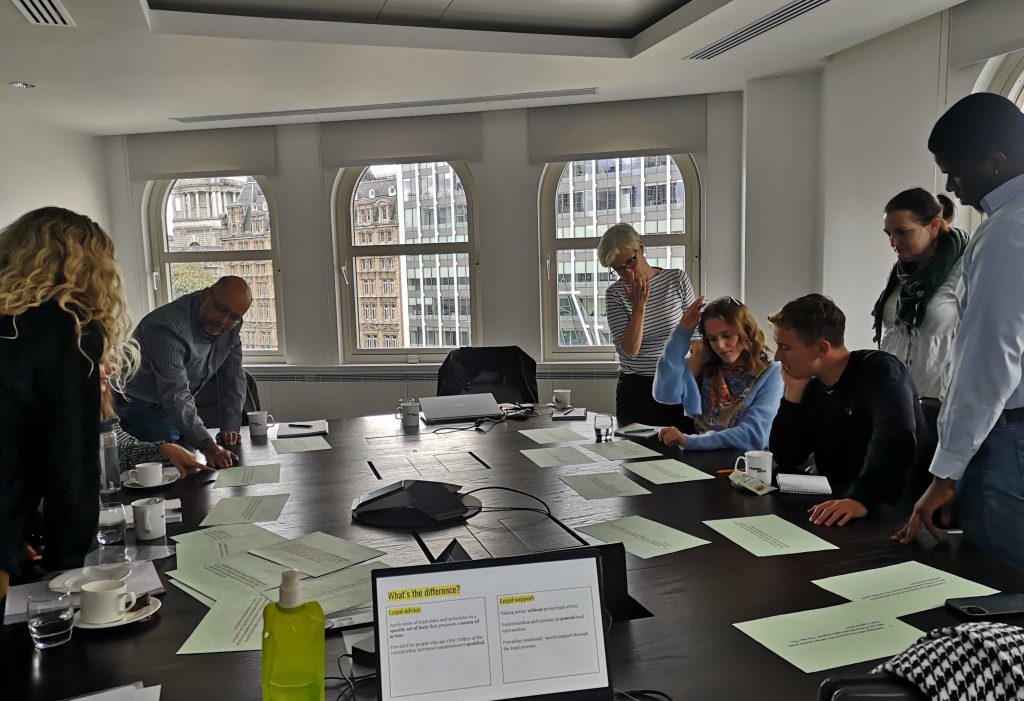
Right to Remain was delighted to run a training workshop for new members of the Refugees at Home team on Thursday 22 September. Refugees at Home is a UK charity which connects those with a spare room in their home to refugees and asylum seekers in need of somewhere to stay. Its work is so important, especially at a time when the impacts of the hostile environment and Home Office delays are being felt so heavily.
Right to Remain’s Toolkit is used by many people going through the asylum and immigration system and numerous organisations and groups who are supporting them. Last year alone, over 251,000 people accessed our Toolkit on-line. This helps people to know their rights at different stages of the system, and know what options are for the stage they are at. Knowing what could come next can help them prepare.
Our Toolkit workshops are special occasions where we can explain directly to people who have existing relationships with people going through the system how to use the Toolkit. We also learn about the types of questions they encounter, too. Most importantly, through workshops, we see people starting to understand how to give legal support (even if they are not qualified to give legal advice). Now, more than ever, people need to be guided to accurate legal information. This is because many people are unable to get a Legal Aid lawyer to represent them, or perhaps because of the changes made by the Nationality and Borders Act 2022.
We are most excited when we see that the Toolkit is creating an ever widening circle of solidarity. Our community’s need to equip ourselves with knowledge to navigate this complex asylum and immigration system, to protect each other, is greater than ever.
What the workshop covered
We started the workshop how we usually do: by going through how to actually use the Toolkit and how to get the most out of it and other Right to Remain resources.
Although our resources are quite easy-to-use, there are so many good bits of information that getting a ‘tour’ of it all can help you find things you wouldn’t otherwise see! For instance, we pointed out how to use the search bars to find exactly what you’re looking for on our website or in the Toolkit specifically.
We also pointed out the Asylum Navigation Board which is a great resource for learning about how the different stages of the asylum process fit together, or to test your knowledge of the system and steps you can take if you are faced with a problem.
We then introduced our workshop attendees to the Young Asylum Guide. This is a version of the Toolkit that was made for young people who are seeking asylum, because their experience is a bit different to what adults go through. The Guide explains the process in simple terms, and features lovely illustrations that were created by young asylum seekers!
Focus points
We then focused on three main themes for the rest of the session: an overview of the asylum system, fresh claims, and legal support vs. legal advice.
It is important for us all to understand the asylum system as a whole for many reasons. For example, it can help people who provide support to those who are at a certain stage of the system understand their situation better. It also helps people who are currently seeking asylum to see where they are in the system and to see that they are not alone in facing delays, and shows them things they can do for their claim while they wait.
It is also important to understand the asylum system as a whole, to see how and at what points the Nationality and Borders Act has changed things and will continue to change them.
We spoke about fresh claims because they are an important part of the asylum process. They are important because give many people an opportunity to have their asylum claim heard again at a time when they think it is the end of the road (after an appeal refusal). It can also be quite tricky to put in fresh submissions (this means new evidence) for a fresh claim without a lawyer or legal representative.
Lastly, we covered the difference between providing legal advice (this is something that only qualified people can do) and providing legal support (most people can do this). At a time when it is more difficult than ever to get a Legal Aid lawyer, it is important that other people who are working with people seeking asylum are educated and able to pass on key information about the legal process and provide support throughout the journey.
Many thanks to the Refugees at Home team for being such an active and curious group. Best of luck with your new positions.
If you would like to learn more about our Toolkit, we will be running virtual, public ‘Knowledge is Power’ Toolkit workshops in October. Stay tuned!
















Discussion: